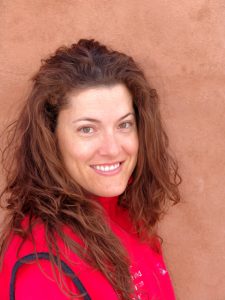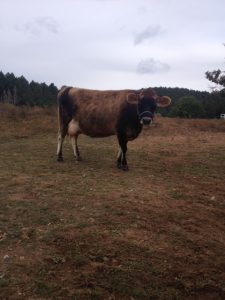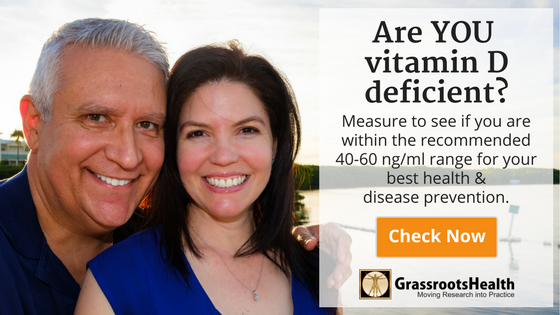Published on June 29, 2017

Delia Garcia
Registered Dietician
Northern New Mexico
42 years old
Family of 5 – with children aged 8, 6, and 4
Last recorded D-level = 52 ng/ml
Facebook: Delia Core Fitness
Do you think a typical American diet would be vitamin D sufficient? (40-60 ng/ml)
No, the Standard American Diet (SAD) is deficient in many vitamins and minerals and creates inflammation and chronic disease which can then cause undernourishment. Our vitamin D levels have decreased since the start of the low-fat, fat-free and cholesterol-free diets. This is because vitamin D is a fat-soluble vitamin, meaning, it is only found in animal fats such as fatty fish and egg yolks.
When I was consuming the SAD, I had positive blood tests for an autoimmune disease. I was depressed, suffered from constipation, and felt horrible. I refused to be “officially diagnosed” and put on meds. My aunt suffered from Lupus, my grandmother from rheumatoid arthritis. I knew where my life was headed and chose the road less traveled.
How have you managed to keep your vitamin D level up without supplementation or sun?
I simply eat real food! It took several years for it to come to this but with determination and a drive for knowledge, I can now say it. I am professionally trained as a Registered Dietitian (RD). My health crisis drove me to seek other teaching modalities because I knew the SAD wasn’t going to heal me (it’s what got me to that point). Paul Chek, the founder of the CHEK Institute, is where my life changed for the better. His information rocked my world, to say the least. Then, I found out about Weston A. Price and I’ve never looked back. I have remained an RD to be able to educate others on this “new” information that I continue to learn about!
I have empowered myself by raising my own food and do soil testing to make sure my soil is where it needs to be when it comes to nutrients; most commercial soils are depleted of key nutrients that help convert vitamin D to its active form. The food that I cannot raise or grow, I purchase either locally or from companies that I know who have the same values that I do.
I have downsized my life, gotten rid of excess and the unnecessary so that I can afford and have the time to do what I think is necessary to be healthy. Food is the foundation of health!
Within the last 10 years, I have completely changed my lifestyle by what I put in (food and drink) and on my body (lotions, soaps, deodorant, makeup, etc.); and by what I do not allow in my house (chemicals, fragrances, synthetic materials, etc.). I had to heal my gut, correctly and safely detoxify, and replenish my body of missing nutrients that was determined by specific lab testing.
I am outside every single day, rain or shine. I don’t wear sunscreen but I do wear a sunhat. My arms and legs are exposed (except in winter). I live at 7300 feet above sea level. I do avoid the sun during the hottest part of the day and I’m outside anywhere from 30 minutes to 2 hours depending on my work. I either do my work first thing in the mornings or late afternoon/early evening when it’s cooled off.
Describe a typical day in your diet.
I think the important place to start is with a healthy gut. If your gut is compromised (such as leaky gut syndrome), you’re not going to be able to assimilate and absorb the nutrients from what you eat. The health of the gut microbiome has everything to do with the health of the host.
A typical day in my diet consists of:
Breakfast:
 Fresh milk from my certified Jersey milk cow. Fresh eggs from my chickens and ducks (they are free range and are fed organic, sprouted Kamut, sunflower seeds and clabbered fresh milk). Organic potatoes fried in tallow (rendered fat from home-raised beef), lard (rendered fat from home raised pigs), raw butter or coconut oil. Sprouted bread with raw butter and a serving of fresh fruit and a fermented veggie such as sauerkraut or beets.
Fresh milk from my certified Jersey milk cow. Fresh eggs from my chickens and ducks (they are free range and are fed organic, sprouted Kamut, sunflower seeds and clabbered fresh milk). Organic potatoes fried in tallow (rendered fat from home-raised beef), lard (rendered fat from home raised pigs), raw butter or coconut oil. Sprouted bread with raw butter and a serving of fresh fruit and a fermented veggie such as sauerkraut or beets.
Mid-morning snack:
Kefir made from fresh cream, seasonal fresh fruit, veggies from the garden (I eat as I work in the garden), raw nuts and seeds like walnuts or pecans and sunflower seeds that have been properly soaked, sprouted and dehydrated.
Lunch:
Homemade broth-based soup (veggies from the garden like onions, garlic, cabbage, squash and tomatoes, and home-raised turkey).
Mid-afternoon snack:
Either a fruit smoothie (kefir, frozen fruit, coconut milk, supplements like cordyceps, astragalus, alfalfa, chlorophyll, etc.) or milkshake (fresh milk, raw egg yolks, raw cacao for a good dose of magnesium). Fermented carrots and pickles or sauerkraut.
Dinner:
Roasted homegrown chicken, root veggies such as sweet potatoes, beets and turnips, coconut oil or tallow, and a nice big glass of fresh milk.
If I’m craving something sweet and fruit doesn’t cut it, I’ll reach for the organic dark chocolate.
Which foods do you believe are the most beneficial for vitamin D synthesis?
I think probiotics (good quality sources of pickles, sauerkraut, kefir, kombucha) and bone broth are the most healing and supportive to the gut so that in return it can digest and absorb the nutrients needed for vitamin synthesis and activation. It’s those “good bugs” in our gut that help us assimilate vitamins and minerals.
Also a good diet with plenty of healthy fat such as tallow, lard, butter, and coconut oil (excellent quality of course). We need cholesterol and saturated fats in our diet.
How has D*action and GrassrootsHealth helped you?
I’m thankful for being able to do a home vitamin D kit because I’m the one in charge of my health, not a doctor.
GrassrootsHealth has given me the opportunity to empower others. If we are proactive about our health, we can start to see changes. These changes start creating a new demand.
What would you like to tell the readers?
Let food be thy medicine and medicine be thy food. -Hippocrates.
Follow me on Facebook at Delia Core Fitness and Instagram at DeliaCoreFit where you can catch a glimpse of my lifestyle and get daily nutrition and detox tips and suggestions.

